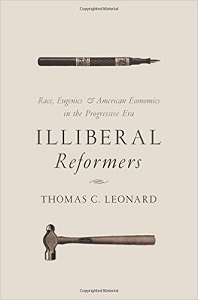A former nurse at a U.S. Immigration and Customs Enforcement detention center has alleged that hysterectomies are being performed on detainees without informed consent. The problem of medical care within prison environments is always a difficult one, as it’s not clear that meaningful consent can ever be assured under such vulnerable conditions. (Does the prisoner fear punishment or worse if they don’t go along with the procedure?) Yet, denying potentially lifesaving medical interventions is also clearly an egregious abuse of power. The only clear solution to this problem is to take ten giant steps back on the process of incarcerating (or “detaining”) people who do not present an imminent threat to others, starting with those being held for nonviolent offenses.
The possibility that detained women are being given unnecessary hysterectomies particularly raises the hackles because of the United States’ history of forced sterilizations. An estimated 70,000 people were sterilized in the United States between roughly 1907 and the mid-1980s. This was usually based on a determination that they were “diseased” in some way, including by being mentally or physically handicapped, and that therefore the powers that be were justified in preventing them from having children. Not surprisingly, racial and ethnic minorities, people living in poverty, and women deemed promiscuous were particular targets.

The best book I know of on the policies and beliefs that enabled this disturbing practice is Thomas Leonard’s book on the history of eugenics, Illiberal Reformers: Race, Eugenics, and American Economics in the Progressive Era. Eugenics is often confused with Darwinism, but in fact is almost the opposite. Darwinian natural selection is a scientific theory that predicts that genetic traits that are more supportive of survival and reproduction than others will be more likely to be passed on. Eugenics is a political belief that as societies become wealthier, they will need to take an active role in discouraging the survival of “deficient” people in order to prevent the reproduction of mental and physical weaknesses. The view that western European ancestry was a genetic trait worth protecting was a shockingly popular motivation behind a great number of policy decisions in the early 20th century, including minimum wage (to disemploy minorities and lower classes), restrictions on women’s work (to prevent white women from working instead of raising children), and—most germane to this latest ICE scandal—immigration quotas and controls (designed to keep out people from Asia and the “undesirable” parts of Europe, including Italy, Poland, Hungary, Russia, Greece, and pretty much anywhere with a sizable Jewish population).
And when I say eugenics was popular, I mean popular. Eugenics was a fashionable belief considered to be based on the latest science. U.S. Presidents (including Teddy Roosevelt, William Howard Taft, and Woodrow Wilson), Supreme Court Justices, prominent intellectuals, progressive activists, and industrialists alike believed in and even advocated for some form of eugenics. It was a matter that crossed the political aisle, uniting conservatives and progressives in a stunning display of illiberality. There are disturbing quotes throughout the book, but perhaps one of the most shocking comes from novelist D.H. Lawrence, who wrote in a personal letter,
Further, dissent wasn’t easy. Leonard recounts one geneticist having an offer to join the Harvard faculty pulled because he came out against eugenics (p. 111-12). The economist Irving Fisher compared denying the truth of eugenics to denying that the earth orbits the sun (p. 113). Notice that all these example are from just a few pages of Leonard’s book, which is slim but stuffed with evidence.
The history of forced sterilization is a cautionary tale for so many reasons. But an underappreciated lesson to take from this episode in history is that even a comfortable, popular belief can over time come to be recognized as deeply flawed, even inhumane. Many otherwise intelligent people were carried away by bad science, bigotry, or a combination of the two. This is an important reminder of the fallibility of scientific consensus and the dangers of using science to justify social control. I can’t think of a single instance where the judgment of history came down on the side of those who were treating any group of people as less worthy of rights, dignity, and respect because the “science” said so.
It’s unfortunately easy to neglect basic human rights in the area of immigration policy. People who are in a country but lack access to whatever rights and judicial protections otherwise enable people to defend themselves from political abuse are always vulnerable. This means that even if these hysterectomies are coming from a single bad actor, this is exactly the environment where we would expect that person to be able to do damage.
In addition to Leonard’s book, here is another set of useful readings if you’d like to learn more about the history of eugenics. I would also highly recommend Sandra Peart and Daniel Levy’s Escape from Democracy: The Role of Experts and the Public in Economic Policy, in which the eugenics movement is offered as one of many examples of the disastrous results of expert-driven social control.
Jayme Lemke is a Senior Research Fellow and Associate Director of Academic and Student Programs at the Mercatus Center at George Mason University and a Senior Fellow in the F.A. Hayek Program for Advanced Study in Philosophy, Politics, and Economics.
As an Amazon Associate, Econlib earns from qualifying purchases.


READER COMMENTS
Kevin
Oct 2 2020 at 1:51am
Eugenics are an evil that should not be tolerated (maybe not even at Planned Parenthood), but I don’t agree that all nonviolent offenders should be spared incarceration. Bernie Madoff is a nonviolent offender. Should people like him just be made to repay their damages and do a little community service or other “restorative justice?” What if the money can’t be repaid? Doesn’t there need to be real consequences to discourage this type of behavior? Why shouldn’t there be a punishment for petty theft, for that matter?
I know that this isn’t exactly the main point of the article, but when I hear people suggest that ALL nonviolent offenders should be free citizens…I just kind of shrug my shoulders and wonder if what is really meant is that victimless crimes shouldn’t be punished with incarceration. Obviously, the two are not one and the same.
Kevin
Oct 2 2020 at 2:06am
I would add, what about crimes like wire interception? We should just issue modest fines and have the offender do some community gardening while on probation? Drug offenses shouldn’t be offenses at all, but I’m fine with sending thieves, computer hackers, and others to jail or prison.
BW
Oct 2 2020 at 7:29pm
Caning could be used for non-violent crimes if fines won’t suffice.
Everett
Oct 3 2020 at 11:39pm
“including minimum wage (to disemploy minorities and lower classes),”
“minimum wage, today argued for in order to uplift the impoverished poor, were in fact designed to do just the opposite—unemploy them, just as economic theory predicts.” ( https://asp.mercatus.org/publications/illiberal-reformers-race-eugenics-and-american-economics-progressive-era )
Whether something was intended to do one thing does not in on its face determine the effects of that thing. Intent is important, but it is not more important than everything else. Minimum wage serves another purpose, at least unless we have a UBI.
Jon Murphy
Oct 4 2020 at 8:52am
Will you be more specific? What is that other purpose?
Everett
Oct 4 2020 at 12:13pm
A random search found this article: https://www.healthaffairs.org/do/10.1377/hpb20180622.107025/full/
Feel free to do more searching on your own.
Everett
Oct 4 2020 at 12:15pm
And the “other purpose” would of course be putting a baseline on compensation per hours employed toward someone else’s benefit.
Jon Murphy
Oct 4 2020 at 12:34pm
That’s what I thought you meant, but I wasn’t sure.
I do recommend you read Leonard’s book. It is indeed the case that minimum wage was to put baseline compensation on certain people’s wages: white people’s wages. Specifically, white males. As Jayme points out, minimum wage was explicitly designed to keep minorities out of the workforce. Many of the supporters of the minimum wage, such as Miles Allgood (D-AL) and John Cochran (D-MO) explicitly cite the fact that minimum wage will keep “cheap colored labor that is in competition with while labor throughout the country” out of the workforce.
Furthermore, as the voluminous research done by Walter Williams, Thomas Sowell, David Neumark, and many others have shown: the negative effects of the minimum wage (unemployment) has fallen predominantly on minorities and the benefits (wages) have gone primarily to upper-class whites.
Indeed, intentions are not results. But in this case, they very much were.
Everett
Oct 4 2020 at 10:36pm
This is the kind of thing I’m very interested in (I’m a liberal but absolutely despise Wilson). I’ve put the book on my to-purchase list.
The spam filter ate my other comment. Apparently there is also a minor, probable effect of an increased minimum wage on various health effects for the lower hoi polloi. Presumably there are other positive effects.
Jon Murphy
Oct 5 2020 at 10:15am
I’ve not read the study you linked too (it appeared for me this morning), but taking it as given, there are no objections from me. Minimum wage does have benefits for the people who get it. The point is the people who do not get it, who bear the costs, are disproportionately minorities and marginal folks.
Jose Pablo
Oct 10 2020 at 8:01pm
Probably the best book on minimun wage … yet
https://oll.libertyfund.org/pages/wswns
Comments are closed.